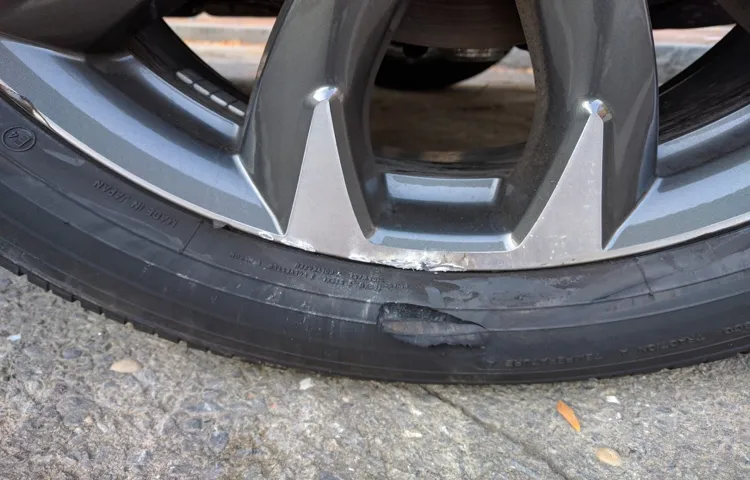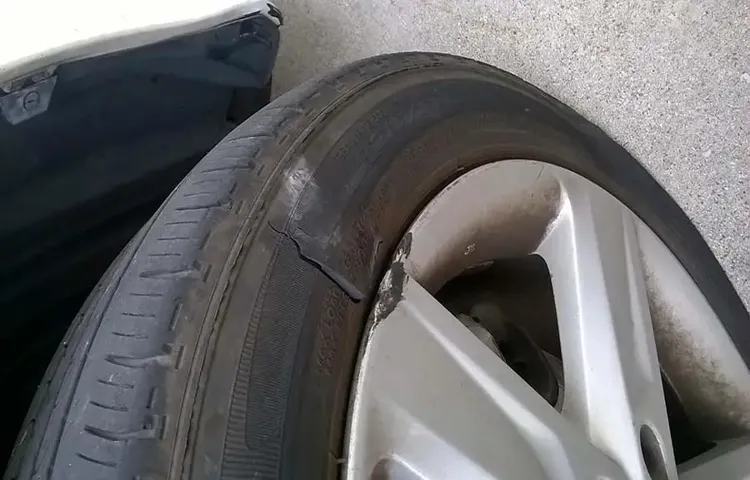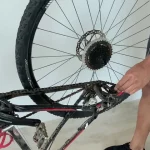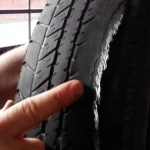Driving on the highway can be a thrilling experience, especially if you are traveling to a long-awaited destination. Unfortunately, there are times when unexpected obstacles can jump in your way, causing a great deal of stress and potentially dangerous situations. One such obstacle is hitting a tire on the highway.
When you are driving at a high speed, there is little time to react, and the consequences of hitting a tire can be severe. So, what should you do if you hit a tire on the highway? In this blog post, we will explore some tips and guidelines to follow if you find yourself in this situation. From checking your vehicle for any damages to assessing your own safety, we’ve got you covered.
Let’s dive in and find out how to handle this unexpected situation with confidence.
Table of Contents
Stay Calm and Keep Control of Your Vehicle
Hitting a tire on the highway can be a scary experience, but it’s important to stay calm and keep control of your vehicle. First, take your foot off the gas and resist the urge to hit the brakes, as this can cause your vehicle to swerve unexpectedly. Keep your hands firmly on the wheel and try to maintain a steady speed.
If necessary, use your hazard lights to signal to other drivers that you are experiencing difficulties. Once you have safely pulled over to the side of the road, assess any damage to your vehicle and call for assistance if needed. Remember, staying calm and in control can help prevent accidents and ensure your safety on the road.
Don’t Panic and Avoid Overreacting
When you find yourself in a situation where you lose control of your vehicle, it can be easy to panic and overreact. However, it’s crucial to stay calm and keep control of your vehicle to prevent further damage. As the driver, the responsibility lies with you to maintain control and remain calm in high-pressure situations.
Remember to take a deep breath and keep a steady grip on the wheel. Avoid sudden actions like slamming on the brakes or turning the wheel sharply. These actions can cause your vehicle to skid or spin out of control.
Instead, ease off the gas pedal and try to regain control of your vehicle gently. It’s also essential to remain aware of your surroundings and other drivers on the road. Stay in your lane and use your signals to communicate your intentions to other drivers.
Remember, in times of crisis, keeping a cool head can be the difference between an accident and a close call. Keep calm and focused, and you’ll be better positioned to handle any situation that comes your way.

Keep Both Hands on the Steering Wheel and Stay in Your Lane
Driving can be stressful, but it’s important to stay calm and in control while on the road. One of the best ways to do this is to keep both hands on the steering wheel and stay in your lane. By doing this, you’re maintaining control of the car and reducing the risk of swerving into another lane or losing control of the vehicle.
It’s important to remember that distractions like phone calls or texting can significantly increase the chance of an accident, so it’s best to avoid these types of activities altogether. When behind the wheel, it’s also essential to pay attention to the road and stay alert at all times. By staying focused on the task at hand and keeping both hands on the wheel, you’re doing your part to ensure a safe and comfortable driving experience for everyone on the road.
Remember, getting to your destination safely is always the top priority.
Assess the Damage and Pull Over Safely
If you hit a tire on the highway, it can be a scary experience, but it’s important to stay calm and take the necessary steps to ensure your safety. The first thing you should do is assess the damage to your vehicle and pull over safely to the side of the road. Check if the tire has caused any visible damage to your car, including a broken windshield, dented fenders, or a damaged bumper.
If there is visible damage or you are not able to safely continue driving, call for emergency assistance. It’s essential to remain vigilant and cautious of other vehicles on the road, as hitting a tire can cause other drivers to swerve or brake suddenly. Remember, safety should always be your first priority in this type of situation.
Check Your Rearview Mirror and Signal Your Intentions
Assessing the damage and pulling over safely should be your first priority if you find yourself in a car accident. It’s important to check your rearview mirror and signal your intentions before moving to the side of the road. This will alert other drivers of your intentions and prevent any further damage or accidents.
Once pulled over, assess the damage of your vehicle and any injuries you or your passengers may have sustained. If necessary, call emergency services for assistance. It’s important to remain calm and collected during this process to ensure the safety of all parties involved.
Remember, accidents happen and it’s important to take the necessary steps to ensure everyone’s safety and well-being.
Drive to the Nearest Safe Location and Park Your Vehicle
One of the scariest situations for anyone while driving is when they experience a collision or an accident. Even the slightest impact can cause a major panic and make it difficult to think clearly, but it is important to remain calm and take the necessary steps to keep yourself and others safe. The first thing to do is assess the damage and pull over safely.
Don’t panic or try to drive away. Rather, take a deep breath, check for any injuries, and if possible, move your car to the nearest safe location. Parking your vehicle on the side of the road or out of harm’s way should be your top priority.
Make sure to turn on your hazard lights and use warning devices such as cones or triangles, so that other drivers can clearly see you and avoid any further collisions. Once you have safely parked your car, assess the damage to your vehicle. Look for dents, scratches, or broken parts, and take pictures of any damage that you observe.
You may also want to survey the damage on any other vehicles involved in the accident or collision, and speak with any witnesses present. Remember, it’s important to document all aspects of the incident to ensure that you receive a fair and just settlement. In conclusion, experiencing a collision or an accident while driving can be a terrifying and stressful event.
However, it’s important to stay calm and follow the necessary steps to ensure your safety and that of others on the road. Take a deep breath, assess the damage, and park your vehicle in a safe location while turning on hazard lights. Remember to document all damage and speak with witnesses to get a fair and just settlement.
By taking these steps, you can minimize the long-term consequences of a collision and move on with a sense of safety and security on the road.
Inspect Your Vehicle and Call for Assistance If Necessary
After a car accident, it’s important to assess the damage and pull over safely. Take a deep breath and stay calm while you inspect your vehicle. Check for any visible damage or leaks, and make sure your car is in a safe position.
Turn on your hazard lights and put on your emergency break to signal to other drivers that you’re not moving. If your car is badly damaged or you’re unsure about the extent of the damage, call for assistance. This might mean calling a tow truck or emergency services.
Remember, your safety is the utmost priority, so take your time and be cautious. By following these steps, you can ensure that you and your vehicle are properly assessed and taken care of.
Report the Incident and Document the Damage
If you hit a tire on the highway, the first thing you should do is pull over safely to the side of the road and assess the situation. Whether you were driving your own vehicle or a company car, it’s important to report the incident to the appropriate authorities right away. This includes contacting the police and your insurance company to report the accident and any damages.
Be sure to take photos of the damage to the car and the tire to document the incident. Additionally, if there were any witnesses to the accident, be sure to obtain their contact information as it may be useful for insurance purposes. It’s also important to note that hitting a tire on the highway can cause serious damage to your own vehicle, leading to costly repairs or even a total loss.
By reporting the incident and documenting the damage, you can ensure that you receive the necessary compensation for repairs or replacement of your vehicle.
Call the Police or Highway Patrol and Report the Incident
When involved in a car accident or witnessing one, it’s crucial to report the incident to the authorities. The first thing you should do is call the police or highway patrol and report the accident, providing them with accurate details of the incident. Reporting the incident to the authorities helps to document the damage caused by the accident, which could be used as evidence in any future legal proceeding.
It’s essential to report the accident even if nobody was injured, as this can prevent any false claims that could later arise. When reporting the accident, be honest about what happened, and do not admit fault or blame anyone else. The police or highway patrol officer will arrive at the accident scene and investigate the incident and take statements from witnesses.
It’s always best to have a police report on file, and this may come in handy when filing an insurance claim. Remember that reporting the incident to the authorities is crucial for your safety and the safety of others.
Take Photos and Record Details for Insurance and Legal Purposes
After experiencing damage to your property, the first thing to do is to report the incident to your insurance company. This will help to determine if your specific situation is covered by your policy. It is also essential to document the damage by taking photos and recording details for insurance and legal purposes.
This way, you have evidence to back up the claim for compensation. Ensure to capture all the damages from different angles to avoid missing out on anything. Also, record the time and date when the damage occurred, as well as the cause of the damage.
This information may come in handy when making a claim, and it can also be of great help in any legal proceedings, especially when seeking compensation. It is essential to be as detailed as possible while documenting everything as it can significantly impact the outcome of the claim. In the end, reporting the damage and documenting everything can help you get the compensation you need to repair or replace your property.
Prevent Accidents by Maintaining Your Vehicle and Being Alert
Driving a car requires not only concentration but also the ability to make split-second decisions. In the event of hitting a tire on the highway, safety should always be the priority. The first step is to slow down as much as possible and safely pull over to the side of the road.
Assess your vehicle for any damage, including any flat or damaged tires. If the tire that was hit is still attached to your car, do not attempt to remove it while on the highway. Call local law enforcement or a nearby tow truck company for assistance.
Also, periodic vehicle maintenance can significantly reduce your chances of being involved in an accident. Make sure to check tire pressure regularly, including the spare tire’s pressure, and inspect tire tread wear. Taking a few minutes to ensure your vehicle is in top condition can help prevent accidents on the road.
By staying alert and maintaining your vehicle, you’ll be better prepared to handle unexpected situations like hitting a tire on the highway.
Check Your Tires Regularly and Replace Them When Needed
Keeping your car well-maintained is crucial in preventing accidents on the road. One often overlooked aspect of vehicle maintenance is checking your tires regularly. Your tires are the only point of contact between your car and the road, so it’s important to make sure they’re in good condition.
You can easily check your tires’ condition by inspecting the tread depth and looking for any signs of wear or damage. If your tires are worn down, it’s time to replace them. Driving on bald tires can increase the risk of hydroplaning on wet roads, reduce your ability to stop on time and make turning more difficult, which can all lead to accidents.
It’s best to replace your tires before they become a safety hazard. Remember to get your tires rotated regularly and maintain proper air pressure to extend their lifespan and keep them in good condition. Taking these steps will ensure that your tires are always ready to keep you safe on the road.
Stay Focused and Alert When Driving, Especially on Highways
When driving on highways, it’s important to stay focused and alert to prevent accidents. Maintaining your vehicle is crucial, as it can help prevent unexpected breakdowns or malfunctions that can lead to accidents. Additionally, being alert while driving can help you identify potential hazards on the road and react accordingly.
This means avoiding distractions like using your phone or eating while driving, as even a moment of inattention can have serious consequences. Remember, accidents can happen in the blink of an eye, so it’s important to always be prepared and stay vigilant. By taking these simple steps, you can help keep yourself and others safe on the road.
So next time you hit the highway, make sure you’re alert, focused and prepared to take on whatever challenges the road may bring.
Conclusion
In conclusion, if you find yourself in the unfortunate circumstance of hitting a tire on the highway, remember these three steps: stay calm and assess the damage, safely move your vehicle to the side of the road, and contact a professional for assistance. And always remember, when life throws you a curveball, just keep rolling with it – just be sure it’s not a tire from the car in front of you!”
FAQs
What should I do if I hit a tire on the highway?
First, try to safely pull over to the side of the road and turn on your hazard lights. Check the condition of your vehicle and make sure you are not injured. Then, call for roadside assistance or the police if necessary.
Can hitting a tire on the highway cause damage to my car?
Yes, hitting a tire on the highway can cause significant damage to your car. It can damage the tires, suspension, alignment, and even the undercarriage.
Is there any way to prevent hitting a tire on the highway?
There is no guaranteed way to prevent hitting a tire on the highway. However, you can reduce your chances by maintaining a safe speed, avoiding distracted driving, and keeping a safe distance from other vehicles.
What are some common causes of tires being left on the highway?
Tires can come loose from vehicles due to improper installation or maintenance, overloading, or hitting a pothole or curb. They can also fall off of land or construction vehicles.
Should I try to remove the tire from the highway myself?
No, do not attempt to remove a tire from the highway yourself. This is extremely dangerous and can lead to serious injury. Call for professional assistance instead.
Am I responsible for any damage caused to other vehicles if the tire I hit was from another car?
It depends on the circumstances. If the other driver was negligent in securing their tire, they may be liable for damages. However, if the tire came loose due to an unavoidable accident, you may not be responsible.
Can hitting a tire on the highway result in legal consequences?
It is possible for hitting a tire on the highway to result in legal consequences if it leads to an accident or injury. However, if you were driving safely and the tire came loose out of nowhere, you are unlikely to face any legal repercussions.



